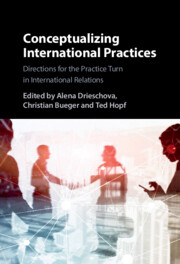Book contents
- Conceptualizing International Practices
- Conceptualizing International Practices
- Copyright page
- Contents
- Figures
- Table
- Contributors
- Acknowledgements
- Part I Introduction: Conversations and the Evolution of Practice Theorizing
- Part II Key Concepts of IR Scholarship
- 3 Epistemic Communities of Practice
- 4 Practices and Norms
- 5 The Normativity of International Practices
- 6 Resistance as Practice
- 7 For a Practice Approach to Authority
- 8 Evolution in International Practices
- Part III Innovative Concepts
- Part IV Conclusion: The Future of Practice Theorizing
- References
- Index
4 - Practices and Norms
Relationships, Disjunctures and Change
from Part II - Key Concepts of IR Scholarship
Published online by Cambridge University Press: 09 June 2022
- Conceptualizing International Practices
- Conceptualizing International Practices
- Copyright page
- Contents
- Figures
- Table
- Contributors
- Acknowledgements
- Part I Introduction: Conversations and the Evolution of Practice Theorizing
- Part II Key Concepts of IR Scholarship
- 3 Epistemic Communities of Practice
- 4 Practices and Norms
- 5 The Normativity of International Practices
- 6 Resistance as Practice
- 7 For a Practice Approach to Authority
- 8 Evolution in International Practices
- Part III Innovative Concepts
- Part IV Conclusion: The Future of Practice Theorizing
- References
- Index
Summary
Scholars of international practices distinguish practice-based and norm-based approaches to the questions they address. They highlight that practices have a material dimension that norms lack, and operate via a logic of practicality, not a logic of appropriateness. Yet practices, understood as ‘competent performances’, are often tied to norms: what counts as ‘competent’ is often implicitly defined by shared expectations about appropriate behaviour. The relationship between norms and practices, however, remains largely unexplored and ambiguous. We provide greater clarity by addressing two questions: How closely are norms and practices linked? Do changes in one produce changes in the other, and under what conditions? While norms and practices can be tightly coupled, we argue that disjunctures between them are also possible. In some cases, practices – and background knowledge on which they are based – tap into extant norms, frames, or discourses. In other cases, practices become disconnected from the norms to which they are attributed. A practice-based approach makes it possible to detect and explore these inconsistencies, which might otherwise pass unnoticed in the short term. Over the long term, disjunctures can lead to overt contestation and norm change. We illustrate these points by drawing on evidence from United Nations peace operations.
- Type
- Chapter
- Information
- Conceptualizing International PracticesDirections for the Practice Turn in International Relations, pp. 77 - 99Publisher: Cambridge University PressPrint publication year: 2022
- 13
- Cited by

